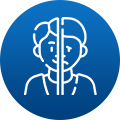Bipolar Disorder Treatment
in Cincinnati, Dayton,
and Columbus
You don’t have to suffer from bipolar disorder without support.
Get in touch to schedule a confidential consultation today!

Bipolar Disorder
Treatment in Ohio
KAV Mental Health & Psychiatry is a trusted provider of individualized treatment for bipolar disorder in the greater Cincinnati, Dayton, and Columbus areas. Our team is led by experienced bipolar doctors, psychiatrists, and licensed mental health therapists to ensure our patients have access to the highest quality care possible. We offer bipolar treatment services through a convenient online video platform so patients can receive the guidance and support they need from the comfort of their own homes.
What Is Bipolar Disorder?
Formerly known as manic depression, bipolar disorder is a mental illness that causes extreme mood shifts from lows (depression) to highs (mania or hypomania). These swings can also cause drastic changes to a person’s energy levels, ability to think rationally, and capacity to perform day-to-day tasks.
People with bipolar disorder experience periods of depression where they feel sad, hopeless, and are unable to take interest in their usual activities. These are followed by episodes of elation, high energy, and risk-taking, known as mania or its slightly milder form hypomania.
Bipolar disorder is a lifelong condition, and sometimes people don’t recognize when they have it or are experiencing its symptoms. This can lead to severe disruptions in their lives: for example, when they’re depressed and lacking energy, they may lose their employment if they can’t show up for work, or spending money they don’t have and going into debut during a manic episode.
Types of Bipolar Disorders
There are several types of disorders under the umbrella of bipolar disorder One of the biggest differentiators between the two subtypes is the presence of mania or hypomania. Hypomania is a milder form of mania where they symptoms are not as obvious and last for a few days, compared to weeks.
Bipolar I Disorder:
The patient has had at least one manic episode, that may be preceded or followed by a depressive episode.
Bipolar II Disorder:
Periods of depressive episodes and hypomania, without an instance of full-blown mania.
Cyclothymic Disorder:
At least two years of hypomanic and depressive episodes; generally, both the hypomania and depression will be less intense than with either bipolar I or II.

Signs & Symptoms of
Bipolar Disorder
Those with bipolar disorder will have varying symptoms depending on the subtype of disorder they have and whether they’re in a depressive or manic episode. Age can also affect some symptoms.
The common symptoms of depression are:
- Feeling hopeless, sad, or tearful
- A drastic loss of interest or lack of pleasure from most or all activities
- Insomnia or oversleeping
- Fatigue or loss of energy
- Significant changes to weight and appetite
- Feeling worthless or excessive guilt
- Difficulty focusing
- Thoughts of self-harm or suicide
- Children and adolescents often become more irritable
Manic episodes generally have the following symptoms:
- Increased activity, energy, or agitation
- Feeling abnormally jumpy, twitchy, or upbeat
- Inflated sense of well-being and self-confidence
- Decreased sleep
- Racing thoughts and speech
- Easily distracted
- Increased risk-taking
- Loss of appetite
- Children and adolescents may act out or overly silly
Causes & Risk Factors of Bipolar Disorder
Scientists and doctors are still studying the causes of bipolar disorder. The current consensus is that there is no single cause, but several factors contribute to the likelihood of a person having it. Some studies indicate that brain chemistry and structure may differ in those with bipolar disorder, but most studies agree that people with certain genes or family history are more likely to develop it.

Signs & Symptoms of Bipolar Disorder

Signs & Symptoms of Bipolar Disorder
Those with bipolar disorder will have varying symptoms depending on the subtype of disorder they have and whether they’re in a depressive or manic episode. Age can also affect some symptoms.
The common symptoms of depression are:
- Feeling hopeless, sad, or tearful
- A drastic loss of interest or lack of pleasure from most or all activities
- Insomnia or oversleeping
- Fatigue or loss of energy
- Significant changes to weight and appetite
- Feeling worthless or excessive guilt
- Difficulty focusing
- Thoughts of self-harm or suicide
- Children and adolescents often become more irritable
Manic episodes generally have the following symptoms:
- Increased activity, energy, or agitation
- Feeling abnormally jumpy, twitchy, or upbeat
- Inflated sense of well-being and self-confidence
- Decreased sleep
- Racing thoughts and speech
- Easily distracted
- Increased risk-taking
- Loss of appetite
- Children and adolescents may act out or overly silly
Causes & Risk Factors of Bipolar Disorder
Causes & Risk Factors of Bipolar Disorder

Long-Term Effects of Bipolar Disorder
Bipolar disorder is a serious illness that can have devastating effects on the lives of those with it if the illness goes unmanaged. Left untreated, depression can cause a person to lose interest in and neglect nearly any important part of their life, while unmanaged mania can lead to financial ruin, health issues, and many other dangers due to increasingly risky behavior.
Though bipolar disorder is a lifelong illness, management of the disorder through prescription medication and condition-specific counseling can be very successful.

Bipolar Disorder Treatment Options with KAV Mental Health & Psychiatry
KAV Mental Health & Psychiatry’s experienced team uses a comprehensive approach to bipolar disorder treatment, which combines safe and effective medication management with supportive menteal health counseling and therapy services.
Prescriptions can be used to help ease the symptoms of both depression and mania. Individual counseling helps our patients develop healthier thought processes to identify and manage their moods when they start to swing towards either extreme. And group therapy allows patients to connect to others with similar issues, look more objectively at their own situation, and learn new ways to manage their behaviors.
KAV Mental Health & Psychiatry’s bipolar disorder treatment is even more accessible with our online telehealth services, which provides all the benefits of our in-person treatment, but from the convenience of your home. Meet with your doctors or counselors easily with six-days-a-week, same-day scheduling, and trust your personalized care will be confidential via our HIPAA-compliant video system.



